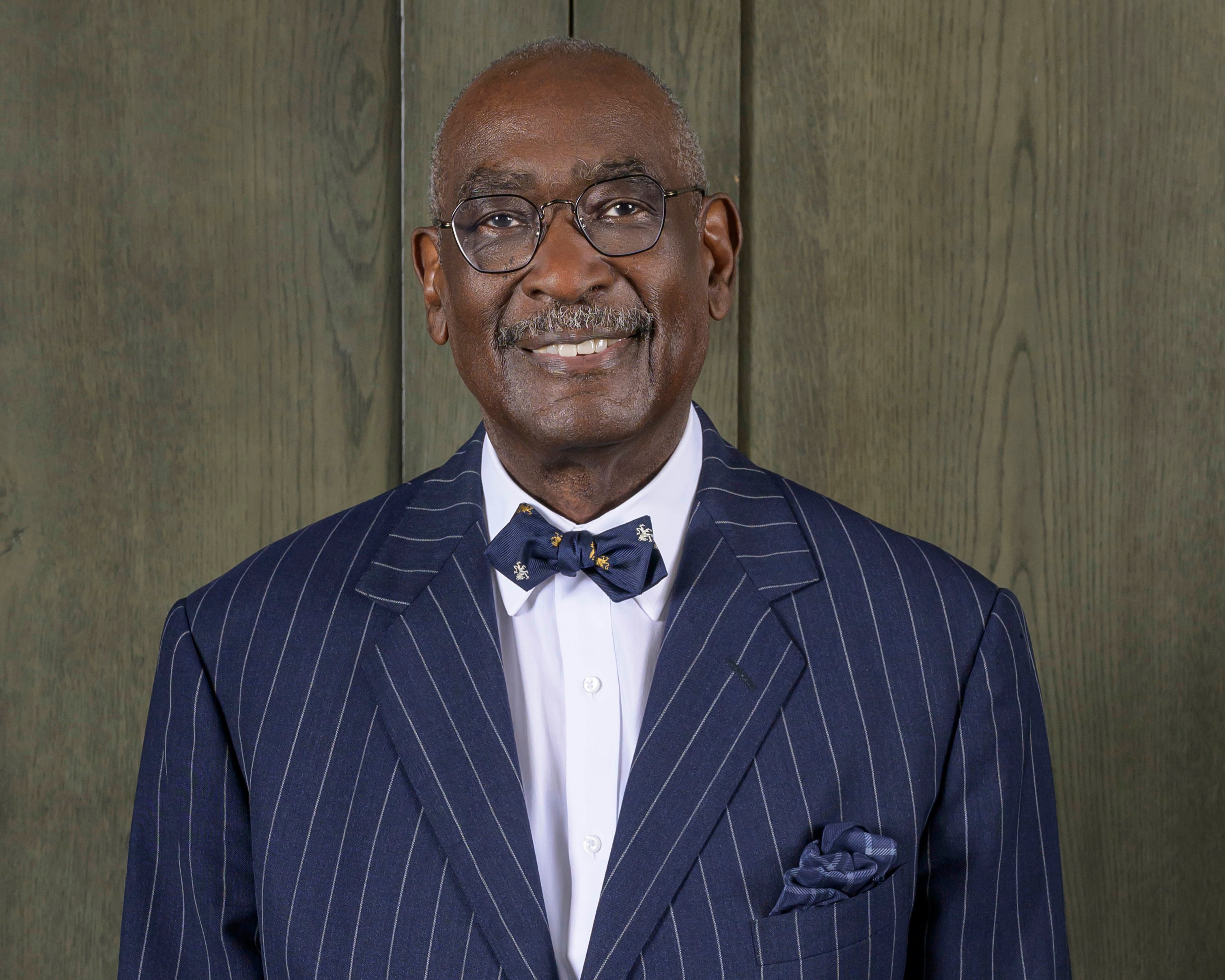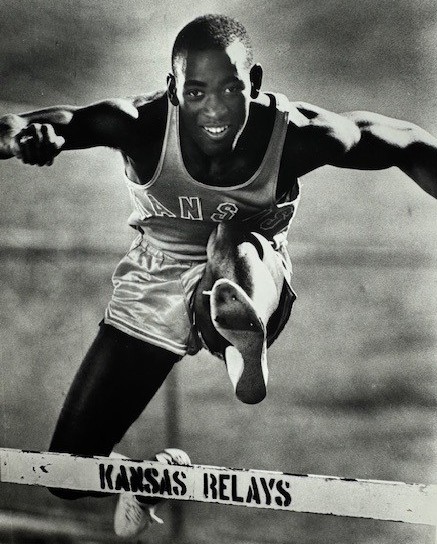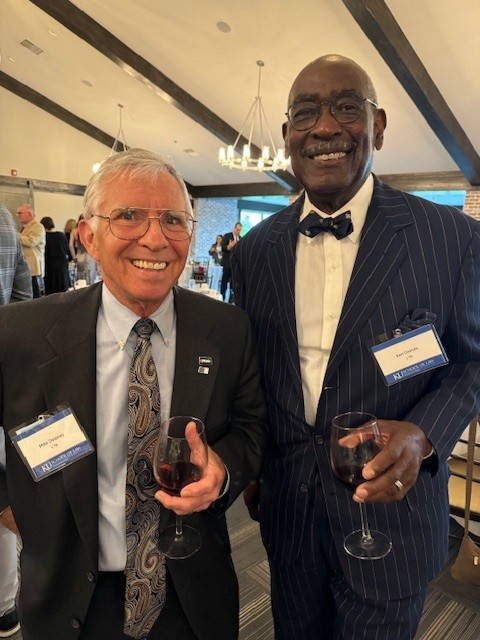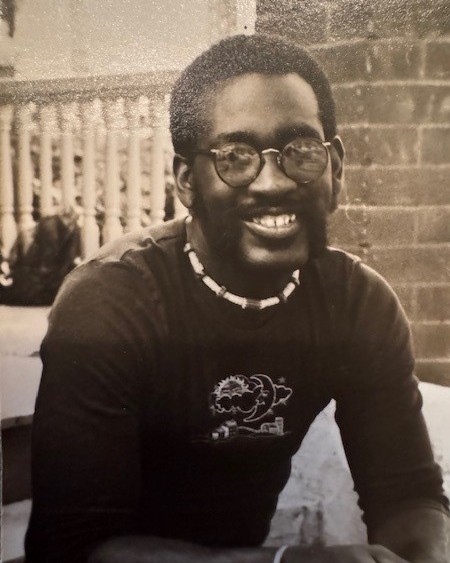No Hurdle Too High
KU Law alumnus Kenneth Gaines turned success on the track into a lifelong mission of mentorship, advocacy and impact in the legal field

In 1965, Kenneth Gaines, L'76, arrived at the University of Kansas on a full athletic scholarship, recruited to join KU’s track and field program. He would go on to blaze trails not just on the track but in classrooms and courtrooms across the country, ultimately shaping generations of law students as a professor, mentor and advocate for underserved communities.
With the exception of a short time spent in Portland, Oregon, during elementary school, Gaines grew up in Kinsley, Kansas. From an early age, he was drawn to sports, especially baseball, basketball and most notably, track. His talent on the track made him something of a local celebrity, even earning autograph requests from fellow students. That standout ability led to a four-year athletic scholarship to KU, an opportunity that would have been financially out of reach without it.

Gaines graduated with a bachelor’s degree in education in 1970, then worked at the Kansas Civil Rights Commission. That experience ignited a new calling: law. In 1973, he returned to KU to pursue his J.D., joining a law school community that looked very different than it does today.

He recalls his class year having only seven Black students.
“It was rough,” he said. “We had a good class that rallied around, and everybody helped each other. I think it was critical that once we got past that first year, we had a lot more confidence about being able to make it the rest of the way through.”
1976, Gaines’ graduation year, was the final year that KU Law was still housed in the historic Old Green Hall (now called Lippincott Hall). Although resources, such as air conditioning, were limited, and classes sometimes met on Saturdays, he still remembers his time there fondly.
“It was definitely a very cool building,” he reminisced. “It had a lot of character and a lot of history there. Creaky stairs and all.”
But what Gaines remembers most from those early years is the resilience and camaraderie that developed among his classmates. He said that, unlike many today, law professors at the time were very standoffish and unapproachable. He recalled that when he had a question about a class subject, he was told to spend more time in the library.

Gaines said that the professors who did stand out to him were the ones who were able to mix a bit of humor into otherwise mundane subjects. One professor with whom he spoke with appreciation was Paul E. Wilson, the former Kansas assistant attorney general and namesake of the Paul E. Wilson Project for Innocence. Wilson was an important figure in the Brown v. Board of Education Supreme Court case, and Gaines said he enjoyed his down-to-earth personality and personal anecdotes about the case.
After graduating, Gaines practiced law in Kansas briefly before relocating to Washington, D.C., where he worked in the chancellor’s office at the University of Maryland. In 1978, an unexpected call from a KU Law classmate on the faculty at the University of South Carolina School of Law led him to a career opportunity down south.
Long story short, he packed up a U-Haul and never looked back.
At USC Law, Gaines became the school’s first assistant dean and a lecturer in law. Over the next four decades, he taught courses in trial advocacy, lawyering skills and evidence, while helping develop one of the school’s most popular clinical offerings, the Criminal Practice Clinic. He saw an opportunity to help give students real-world clinical experience and made the most of it.
Like KU Law’s Project for Innocence, the USC Law Criminal Practice Clinic offers students hands-on experience representing clients accused of criminal conduct in jury trials before the Columbia Municipal Court. Under close supervision by a clinical professor, students develop practical skills in litigation planning, client counseling, fact development, negotiation and courtroom advocacy.
In 1997, Gaines earned tenure and the title of associate professor. Along the way, he took a sabbatical to earn his LL.M. in Litigation from Emory University and later served as director of the USC Law clinical programs. Though now officially retired, he remains engaged as a professor emeritus.
“I still have students now that I see in court or at various functions, and they'll come up and tell me ‘I still use your notebook when I have a trial,’” he said. “You had an impact on them. That’s what makes it all worth it.”
Beyond the classroom, Gaines was active in South Carolina Common Cause, a government watchdog organization, and the Richland Community Health Care Association, which works to bring medical resources to underserved rural communities. He also served as faculty advisor to the Black Law Students Association at USC Law, offering the same kind of support he once relied on 50 years ago.

“My experience at Kansas certainly had a direct impact on that. My experience was that survival was number one, so I had plenty of experience on how to survive,” he said. “I think my leadership in terms of being an advisor was very, very helpful.”
Gaines’ legal career has been marked by service, mentorship and quiet excellence, qualities recognized by the KU Law community when he was named a Distinguished Alumni in 2025.
“It meant a whole lot,” he said of the honor. “When you're going to law school, there just weren't very many opportunities at the time to get much recognition for anything.”
Looking back, Gaines said he’s most proud of the journey itself. He lists his greatest accomplishments as receiving tenure at USC Law, receiving an LL.M. degree from Emory University, becoming one of KU Law’s distinguished alumni and, most importantly, earning his J.D. from KU Law.
“When you look at it all, if I hadn't graduated from the University of Kansas Law School, where would I have been in the first place?” he said. “It’s a very important point in your career, too, when you're able to get through that first wave. It made everything else a little bit easier.”
And his advice to current students? Follow your inner passions, don’t always take the obvious path and look inward to decide what you like to do, who you want to serve and what gives you satisfaction.
-By Casey Bacot